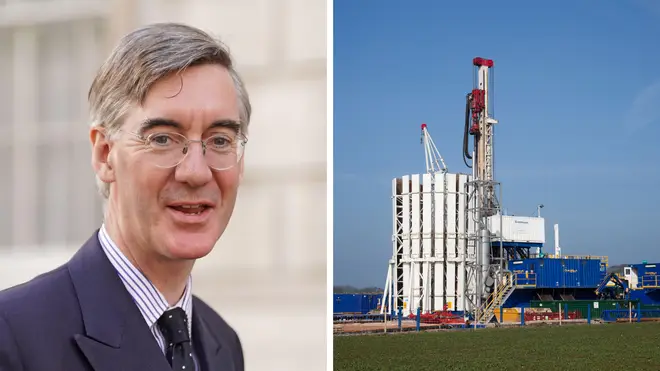
Shelagh Fogarty 1pm - 4pm
22 September 2022, 09:19 | Updated: 22 September 2022, 10:17

The ban on fracking in England is being lifted in order to "gather better data" about the impact on the landscape, the government has confirmed.
Business and Energy Secretary Jacob Rees-Mogg said lifting the ban will help bolster energy security following Vladimir Putin's invasion of Ukraine.
It means fracking applications will be considered "where there is local support", the Department for Business, Energy and Industrial Strategy (BEIS) said.
Mr Rees-Mogg said: "In light of Putin's illegal invasion of Ukraine and weaponisation of energy, strengthening our energy security is an absolute priority, and - as the Prime Minister said - we are going to ensure the UK is a net energy exporter by 2040.
"To get there we will need to explore all avenues available to us through solar, wind, oil and gas production - so it's right that we've lifted the pause to realise any potential sources of domestic gas."
Fracking is a method of extracting gas - a fossil fuel - from the earth, done by drilling into the ground and directing a high-pressure mixture of sand, water and chemicals at shale rock.
It is controversial because it can cause earth tremors, which are a concern to local residents - and for this reason it was temporarily banned in 2019.
It is also a fossil fuel, leading to concerns that widespread fracking would distract the government from investing in greener alternatives such as renewables.
Even Prime Minister Liz Truss' own Chancellor Kwasi Kwarteng has previously spoken out against fracking, saying those calling for it "misunderstand the situation we find ourselves in".
"Even if we lifted the fracking moratorium tomorrow, it would take up to a decade to extract sufficient volumes - and it would come at a high cost for communities and our precious countryside," he wrote in the Mail on Sunday in March.
"No amount of shale gas from hundreds of wells dotted across rural England would be enough to lower the European price any time soon."

Fracking may not be the best solution for the energy crisis
Developers will need to have the necessary licences, permissions and consents in place before they can commence operations, BEIS said.
The Government also published the British Geological Survey's scientific review into shale gas extraction, which was commissioned earlier this year.
BEIS said the review "recognised that we have limited current understanding of UK geology and onshore shale resources, and the challenges of modelling geological activity in relatively complex geology sometimes found in UK shale locations".
Read more: 'Serious concerns' as new report finds Met Police failing in several key areas: 'It must get better'
The Government argued that the limited understanding should not be a barrier to fracking, but instead a reason to drill more wells to gather more data.
"It is clear that we need more sites drilled in order to gather better data and improve the evidence base, and we are aware that some developers are keen to assist with this process," a BEIS statement said.
"Lifting the pause on shale gas extraction will enable drilling to gather this further data, building an understanding of UK shale gas resources and how we can safely carry out shale gas extraction in the UK where there is local support."

James explains why he's worried about fracking
The Government also announced a new oil and gas licensing round, expected to be launched by the North Sea Transition Authority in early October.
This is expected to lead to more than 100 new licences being granted to search for oil and gas in the North Sea.
Watch: 'Don't panic - Putin knows he's losing the war and his nuclear threat is meant to get in our heads'
Energy prices have soared in recent months, partly due to Putin restricting gas supplies from Russia in retaliation to Western sanctions.
Russia is the world's largest exporter of natural gas, but restrictions have been placed on imports from the country after it invaded Ukraine in February.
But prices were already higher than normal even before that.
A cold European winter last year put pressure on supplies, and hot weather in Asia resulted in more gas being used for air conditioning.
As a result of the surging prices countries are scrambling for ways of limiting energy usage, and of sourcing power from elsewhere.